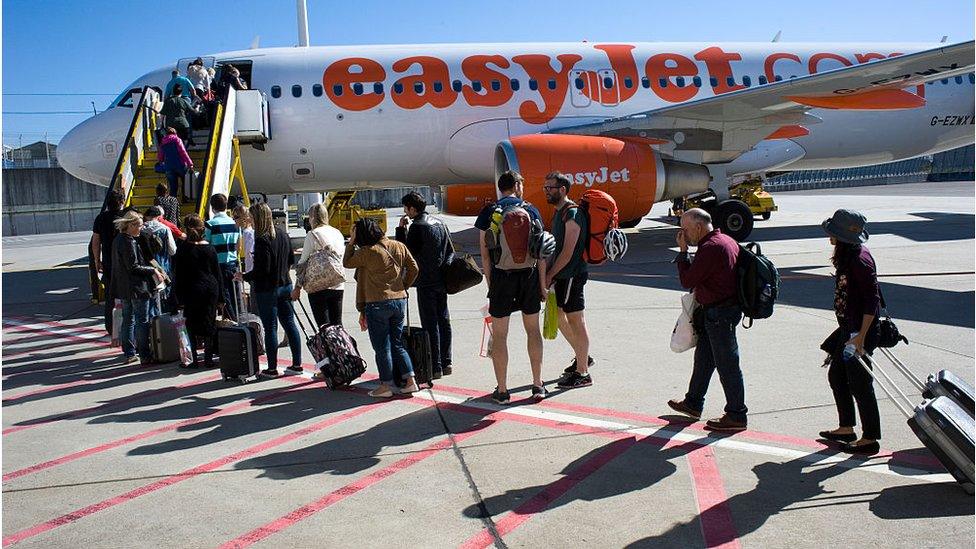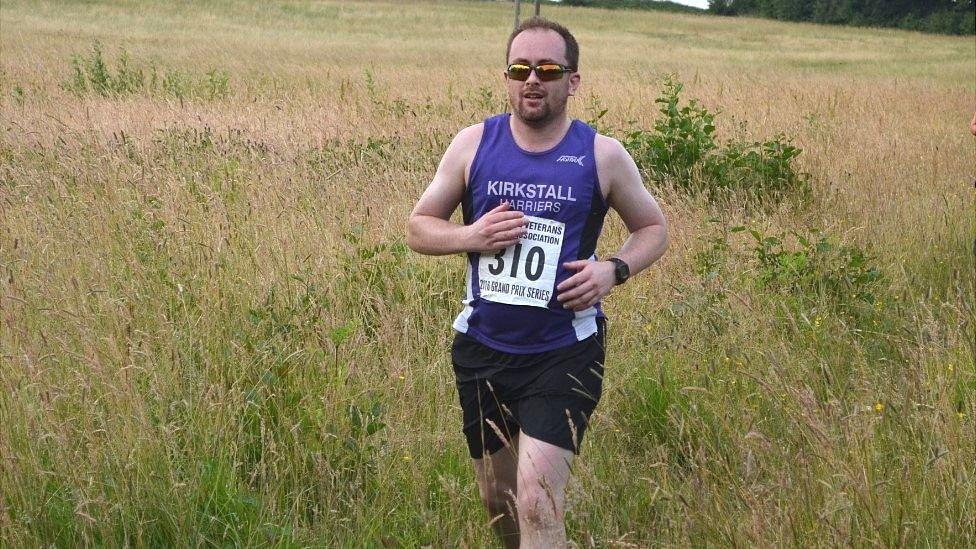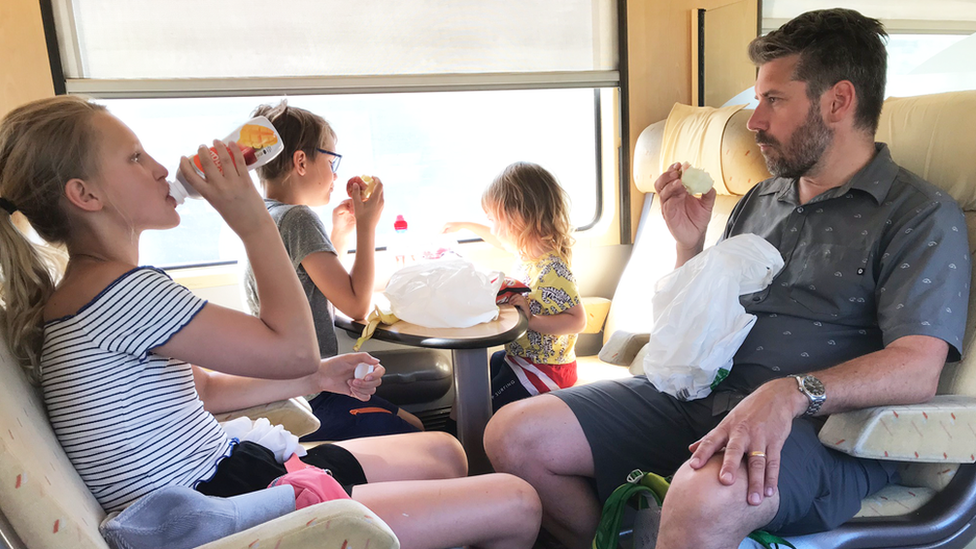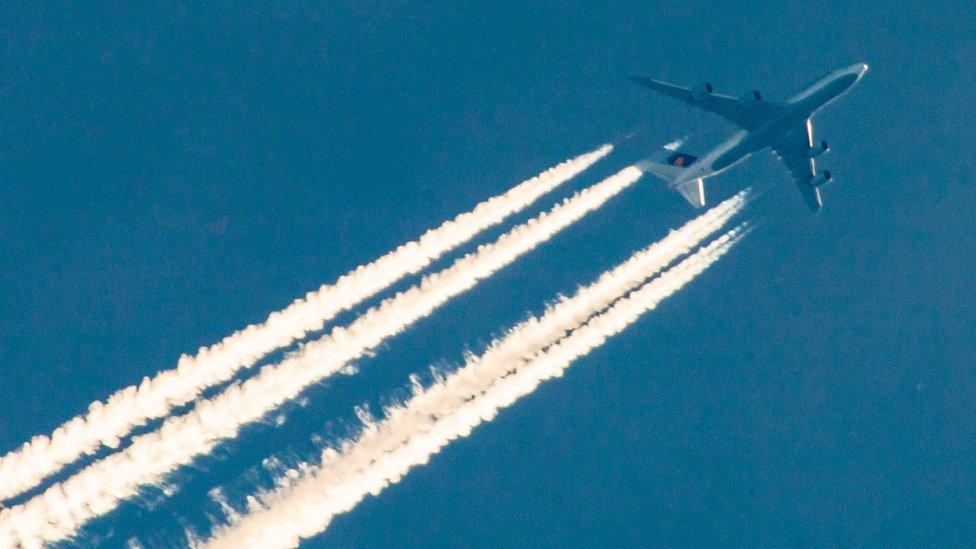'Flight shame' could halve growth in air traffic
- Published

Travellers are beginning to turn their backs on air travel over concern for the environment, according to a survey by Swiss bank UBS.
The Swedish concept of "flygskam" or "flight shame" appears to be spreading.
One in five of the people surveyed had cut the number of flights they took over the last year because of the impact on the climate.
UBS said the expected growth in passenger numbers could be halved if these trends were borne out.
Global air travel has grown by between 4% and 5% a year, UBS said, meaning the overall numbers are doubling every 15 years.
Industry forecasts from plane makers Airbus and Boeing predict growth will continue at that rate until 2035.
But the UBS survey suggests that high-profile campaigns - like the example set by Swedish school girl Greta Thunberg, which has helped push the climate crisis up the political agenda - could trigger a change in flying habits in wealthier parts of the world, particularly in the US and Europe.
After surveying more than 6,000 people in the US, Germany, France and the UK, UBS found that 21% had reduced the number of flights they took over the last year.

'I am taking a 24-hour train journey to avoid flying'

Nathan Molyneaux is now looking to travel more by railway
Nathan Molyneaux, from Leeds, moved to Aarhus in Denmark for work, and since then the number of flights he has taken have increased.
"I moved out here two and a half years ago and flights have ballooned a bit as I have friends in the UK," says the 38-year-old senior sales planner.
"I am flying a lot more than usual and I need to reduce that for the good of the environment - the challenge is to try and not fly at all."
As an extreme example of his new regime, the keen runner plans an overland trip from his home on Denmark's east coast to Barcelona for a half-marathon next February.
"I will take a train from Aarhus to Cologne in Germany, and spend the night there. I will then take two TGV high-speed trains through France and Spain," he says.
"It will be a long journey but that is part of the fun - about 24 hours of travel but I should get to see some beautiful countryside."
He estimates that moving from aircraft to trains as his main mode of travel will be about 20% more expensive, but says his trip to Catalonia will only cost €40 (£36) more.
Mr Molyneaux says there has been a lack of investment in Danish railways in recent years, but that appears to now be changing. He is also disappointed about the reduction in ferry services between the north of England and mainland Europe, with a number of routes axed in recent years.

Only 16% of British respondents said they were cutting back on flying, but 24% of US travellers were worried enough to change their flying habits.
The survey was first conducted in May this year and UBS said there had been a marked change since then.
The bank now expects the number of flights in the EU will increase by just 1.5% per year, which is half the rate expected by plane maker Airbus. The bank forecasted that growth in US flights would fall from the 2.1% expected to just 1.3%.
And that could have a big impact on aircraft manufacturers.
UBS estimates it could reduce the number of smaller planes ordered from Airbus and rival Boeing by 110 each year.
The bank said that would reduce revenues at Airbus, which controls around 57% of the market, by around €2.8bn (£2.5bn) a year.

Are you planning to fly less to help combat climate change? If you'd like to share your views on the issues raised here, you can get in touch by emailing haveyoursay@bbc.co.uk, external.
Please include a contact number if you are willing to speak to a BBC journalist. You can also contact us in the following ways:
WhatsApp: +44 7756 165803
Tweet: @BBC_HaveYourSay, external
Text an SMS or MMS to 61124 (UK) or +44 7624 800 100 (international)
- Published7 April 2019

- Published18 July 2019
